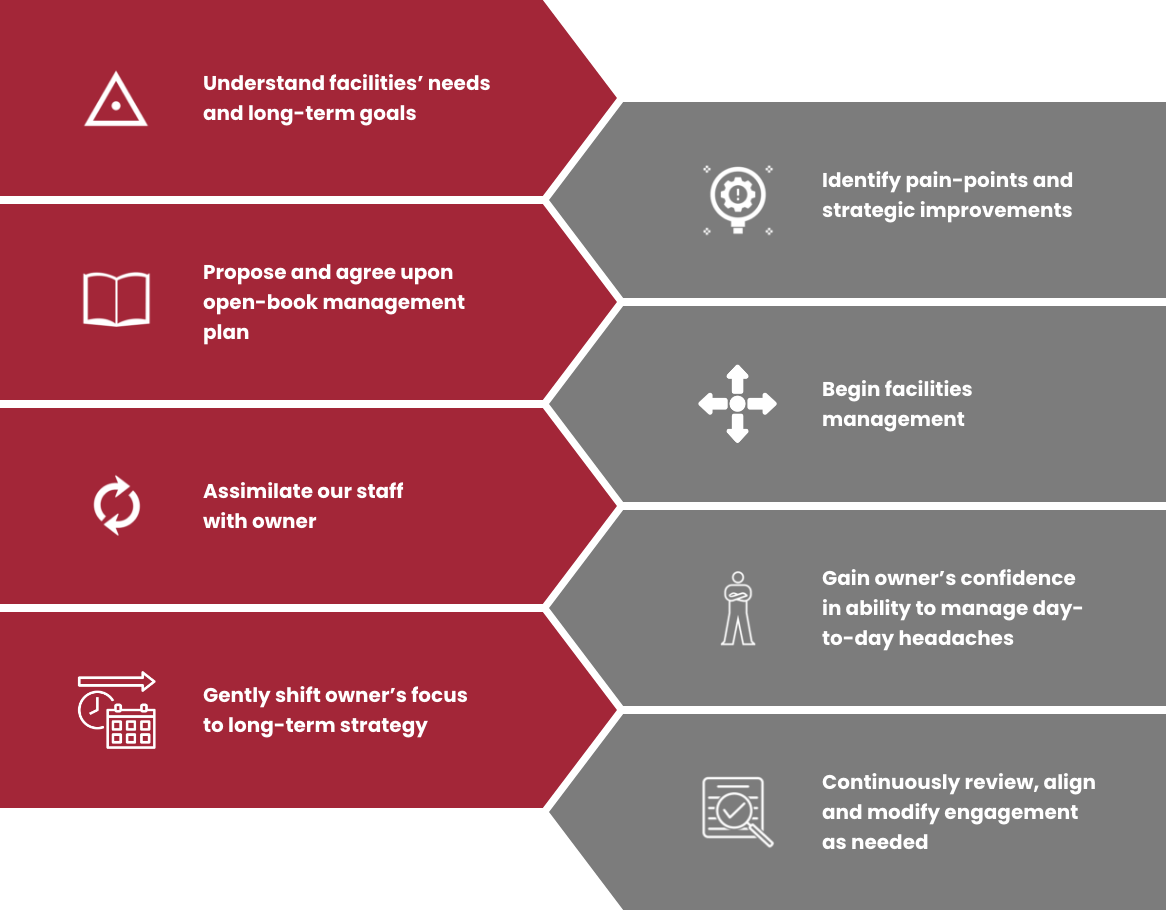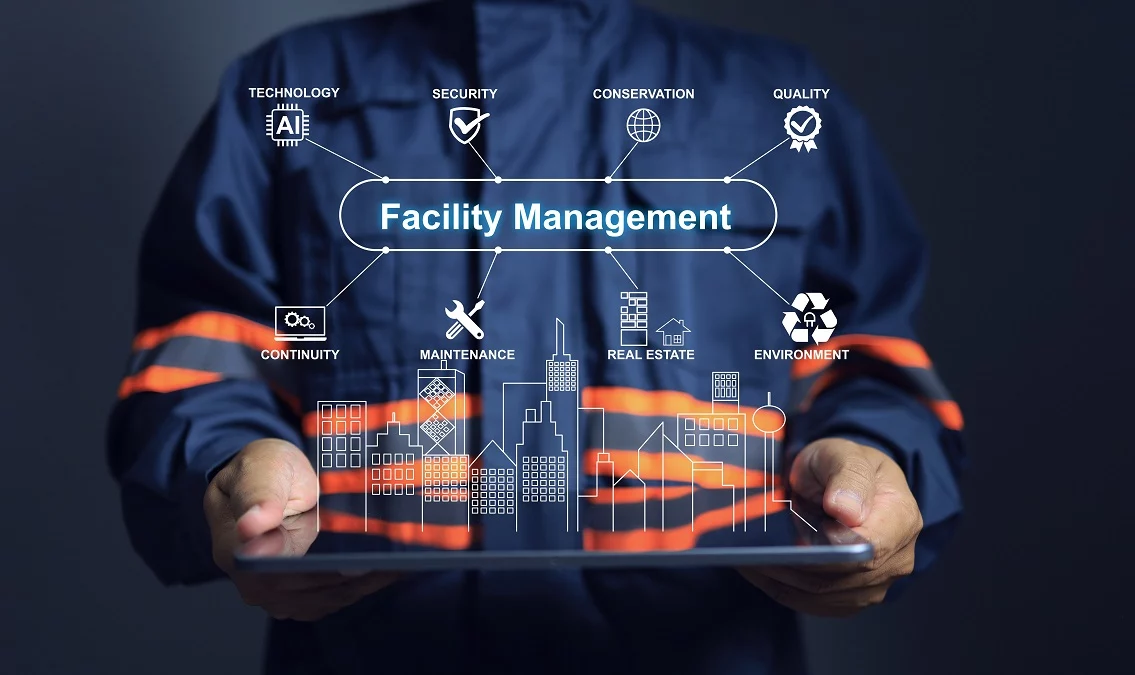Facility Management for Commercial Structures-- A Complete Review
Facility Management for Commercial Structures-- A Complete Review
Blog Article
Secret Trends Forming the Future of Facility Monitoring in 2024
As we expect 2024, the landscape of facility administration is positioned for substantial change, driven by numerous crucial fads. The integration of smart building innovations and a change in the direction of data-driven decision-making promise to improve functional effectiveness while prioritizing sustainability in practice. In addition, the emergence of hybrid work designs is improving workplace settings, necessitating innovative design solutions that satisfy progressing staff member demands. Amid these changes, the focus on occupant health proceeds to obtain grip, highlighting the significance of a healthy workplace. How these trends will certainly show up in method stays a vital inquiry for sector specialists.
Smart Structure Technologies

Smart building innovations incorporate a vast array of systems, including smart lights, HVAC controls, and security systems. By integrating these systems, facility managers can keep an eye on and change specifications in real-time, causing substantial decreases in power waste and functional expenses. For circumstances, clever sensing units can discover tenancy levels and adjust lighting and temperature level as necessary, guaranteeing that energy is just made use of when essential.
Furthermore, these innovations promote boosted data collection, enabling organizations to track use patterns and recognize possibilities for additional renovations. The execution of wise building technologies not just adds to sustainability objectives yet additionally produces healthier job atmospheres that can boost staff member efficiency and fulfillment.
As we move right into 2024, the adoption of wise building technologies will likely increase, reflecting a more comprehensive change in the direction of more smart, responsive, and lasting facility management methods.
Data-Driven Choice Making
Increasingly, companies are leveraging data-driven decision making to boost facility administration practices. By using data analytics, center managers can obtain actionable insights that considerably improve functional efficiency and resource allotment. The assimilation of advanced modern technologies, such as IoT sensors and real-time tracking systems, makes it possible for the collection of large amounts of information on structure performance, occupancy prices, and energy intake.
This riches of info enables center supervisors to recognize fads, forecast maintenance needs, and proactively address problems prior to they escalate. Predictive analytics can forecast tools failures, decreasing downtime and repair service prices. Additionally, information visualization devices facilitate much better communication amongst stakeholders, making certain that informed decisions are made collaboratively.
In addition, data-driven approaches enhance tactical planning by allowing facility supervisors to analyze the performance of current practices and make educated choices concerning investments in innovation or facilities. As organizations progressively focus on functional quality, data-driven decision making is poised to become a foundation of effective facility administration techniques in 2024 and beyond. Ultimately, the capability to leverage data successfully will equip companies to develop much more reliable, efficient, and durable facilities.
Sustainability and Green Practices
The focus on data-driven decision making naturally aligns with the expanding concentrate on sustainability and eco-friendly practices within facility monitoring. As companies progressively prioritize ecological duty, facility managers are leveraging analytics to optimize source usage, reduce waste, and decrease carbon footprints. This calculated technique makes it possible for the integration of energy-efficient systems, such as LED lighting, wise a/c controls, and sustainable energy resources into center operations.
Moreover, the execution you could look here of sustainable practices prolongs beyond energy intake. Facility supervisors are embracing environment-friendly materials and promoting recycling campaigns to produce a circular economy within their centers. This not only improves the environmental profile of the organization yet additionally fosters a society of sustainability amongst workers.
Conformity with environmental guidelines is another essential aspect driving the fostering of green practices. By using information analytics, facility managers can check compliance metrics and determine locations for improvement, making sure adherence to neighborhood and international sustainability standards.
Hybrid Work Versions
A significant shift towards hybrid job versions is reshaping the landscape of center monitoring in 2024. This paradigm incorporates in-office and remote work, necessitating a reevaluation of area application, source allocation, and employee interaction methods. Organizations are significantly identifying the importance of adaptable offices that satisfy varied needs and preferences.
Center managers should adjust by executing functional office layouts that support joint efforts while providing areas for concentrated work. This consists of the integration of innovation to promote seamless interaction and collaboration among in-office and remote employees. Smart structure services, outfitted with sensors and analytics, permit for real-time tracking of area usage, allowing companies to optimize their atmospheres successfully.
Moreover, hybrid work models emphasize the requirement for effective facility management that prioritizes staff member experience. In significance, the hybrid job design is reinventing facility administration, encouraging an aggressive strategy to fulfill the advancing needs of the labor force.
Improved Passenger Wellness
As companies accept hybrid job designs, an enhanced concentrate on passenger health is ending up being indispensable to facility management strategies. Facility Management. This shift acknowledges that a healthy and satisfied labor force directly affects efficiency and retention prices. Facility managers are now focusing on environments that advertise physical and mental health, incorporating aspects such as natural lighting, biophilic design, and obtainable wellness resources

Technology plays an important role in this advancement. Smart building systems can monitor ecological factors and readjust settings in real-time, making sure optimum comfort levels - Facility Management. In addition, responses mechanisms, such as occupancy sensing units and worker surveys, enable facility supervisors to continuously refine wellness initiatives based on owner demands.

Conclusion
In 2024, the future of center administration will certainly be dramatically affected by the combination of smart building innovations and data-driven decision-making, promoting boosted operational efficiency. Sustainability initiatives will prioritize green techniques, while the introduction of hybrid work models informative post will certainly necessitate adaptable office styles. A heightened emphasis on resident wellness through advanced A/c systems and biophilic style will certainly contribute to healthier work atmospheres. These patterns collectively highlight the evolving landscape of center management in feedback to modern challenges and chances.
Center managers are adopting green materials and advertising reusing initiatives to develop a circular economy within their centers.A considerable shift towards hybrid job models is reshaping the landscape of center administration in 2024.Moreover, crossbreed job designs emphasize the need for reliable center management that prioritizes employee experience.As organizations accept hybrid job versions, a heightened emphasis on resident health is becoming integral to facility management methods.In 2024, the future of facility administration will certainly be considerably affected by the combination of smart structure modern technologies and data-driven decision-making, fostering boosted operational effectiveness.
Report this page